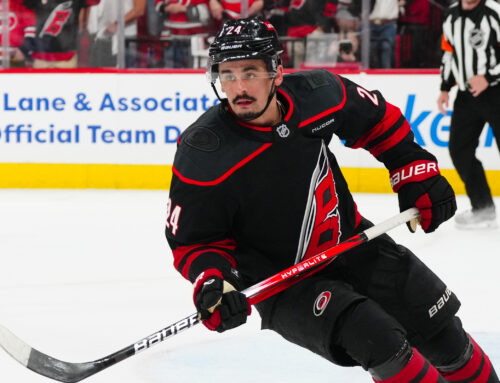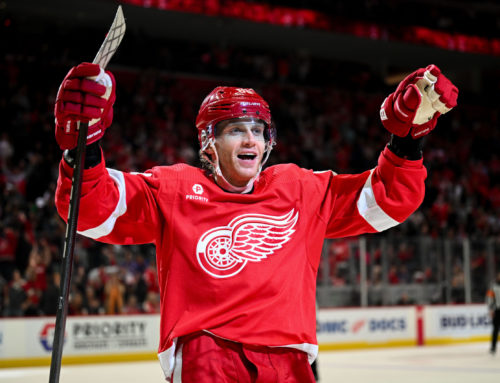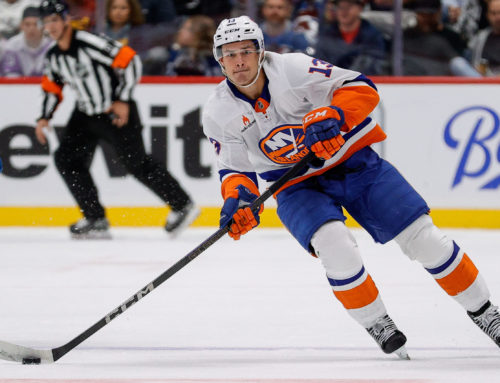
This week's edition of the Eastern Edge looks at the 2016 offseason outlooks for the New Jersey Devils and Ottawa Senators …
After covering the offseason outlook for the Buffalo Sabres and Montreal Canadiens last week, we continue our climb up the Eastern Conference standings. This week will see the spotlight put on the New Jersey Devils and Ottawa Senators, two teams with different sets of expectations heading into the year that finished well outside of a playoff spot in the East. The focus will be put primarily on the short-term rather than the long-term future, although the developments of the next few months will certainly have a great impact on keeper leagues as well.
New Jersey
The Devils had very low expectations heading into this year and were expected to be in the running for Auston Matthews. All things considered, their 84-point output has to be considered a major success. In fact, they were just nine points out of a playoff spot.
As expected, the Devils finished dead-last with just 184 goals and were also last by a wide margin in shots per game. As the team made the move away from its core of mostly veteran forwards to younger options there were bound to be some growing pains. Meanwhile, the team finished ninth in goals allowed and eighth in shots against per game, as Cory Schneider solidified himself as one of the top goalies in the world.
While the Devils failed to light the lamp frequently as a unit, there were several bright spots up front. The top line of Mike Cammalleri, Adam Henrique and Lee Stempniak had incredible chemistry as all three produced quality numbers. As a result of their strong play, Stempniak was able to fetch a second-round pick at the trade deadline from the Boston Bruins.
Additionally, the youth movement gave the opportunity for some new faces to take on greater roles. The most significant breakout player was Kyle Palmieri who surprised with 30 goals and a team-leading 57 points. The fact he was able to get 222 shots on goal bodes well for his future, as his goal total will be more sustainable long-term. The timing of Palmieri’s arrival could not have been better, as there is currently nobody in the organization to challenge him for the top spot on the depth chart at right wing.
The other offensive hopeful is Reid Boucher who only played 39 games but managed 19 points and averaged almost two shots per game despite an average ice time of 14:16. While big numbers are unlikely from Boucher, he should still be considered a solid late-round option in drafts this fall given the lack of offensively-gifted forwards in New Jersey.
On the multi-category front, Joseph Blandisi and Devante Smith-Pelly did enough this year to put themselves on the radar. While both showed some signs of top-six potential, it is more likely they end up being secondary scorers with peripheral categories being their bread and butter.
Meanwhile, veteran center Travis Zajac was able to return to form after an abysmal 25-point campaign in 2014-15. Even though he has yet to crack 50 points since 2010, he is a solid multi-category producer in leagues that count faceoff numbers provided his point total does not dip.
While many forwards put up strong numbers for the Devils, their depth really failed to deliver secondary scoring. To put it in perspective, six of their key bottom-six players (Tyler Kennedy, Sergey Kalinin, Jacob Josefson, Stephen Gionta, Bobby Farnham and Jordin Tootoo) combined for just 28 goals and 75 points. Look for some changes to be made in this area over the summer.
On the blueline, the utilization of Adam Larsson continues to be puzzling. After some great signs at the end of 2014-15 where he took a big step forward as a top-pairing defenseman at both ends, he was saddled with a strictly defensive role this year. He averaged just 10 seconds per game on the power play and started just 32 percent of his shifts in the offensive zone. Meanwhile, David Schlemko finished first in power-play minutes while John Moore finished third.
The setback marks yet another unsatisfying fantasy year for Larsson. While the risk increases with each year he fails to deliver, he should still be considered a dark horse to break out offensively at some point should he get the chance and the team around him improves. The silver lining is he has developed into a fine multi-category defenseman for deeper leagues.
Another disappointment this year was Damon Severson who saw both his ice time and his points per game drop in his second NHL season. Granted, this was his first full year so he should be given a pass for falling short. However, long-term, this year could prove to be costly. This year there was no competition for the top spot in the power-play pecking order, especially with Larsson playing heavy defensive minutes. The fact Severson has yet to solidify himself in the role opens the door for someone to overtake him, whether it be an emerging prospect or an acquisition from outside the organization.
As stated, Schneider has emerged as an elite goaltender. At this point, if the team in front of him can improve he could have a couple years as the most productive fantasy goalie. Given the ongoing youth movement this is unlikely to happen anytime soon but the upside is there for Schneider should the stars align.
Keith Kinkaid has proven to be an adequate backup, although Scott Wedgewood had an excellent year in the AHL and was solid in limited NHL action. Look for the two to battle it out in training camp. If Wedgewood wins, Kinkaid is likely destined for waivers and then the minors given the tough market for goalies.
In the prospect ranks, obviously Pavel Zacha is going to challenge for a roster spot. If he proves to be ready it will go a long way towards helping the team with its depth woes up front. He will have an immediate impact in multi-category leagues and might even be useful in offense-heavy pools out of the gate.
Other depth forwards challenging for roster spots are Blake Coleman and Nick Lappin. Of the two, Lappin offers the most upside after a strong finish to his career in the college ranks. He also had a good showing in Albany to finish off the AHL season with seven points in 12 games, followed by six in 10 during the postseason.
Some long-shots in the mix include Miles Wood and John Quenneville, both 20 years old. Wood is coming off a strong campaign with Boston College while Quenneville should be turning pro after four years in the WHL. Of the two, Quenneville should have the inside track given he is a former first-round pick.
On defense, barring offseason changes look for Seth Helgeson to make the jump as a third-pairing defenseman. Czech defenseman Vojtek Mozik, who has some two-way ability, is also in the mix but will likely not get the chance to do much if called upon.
Ottawa
After a trip to the playoffs in 2014-15, the Senators came into this year with the expectation to get there once again. Their goal total was virtually the same as the year before, but their goals against skyrocketed. No doubt, the fact the team finished near the bottom in shots per game and allowed more shots than any other team played a big role in the opposing teams having no trouble putting pucks in the net all year.
The unsuccessful campaign led to a change at the general manager position with Pierre Dorion taking over and also a new head coach in Guy Boucher. For more on the impact of Boucher on the Sens, check out Ian Gooding’s analysis of his hiring.
Up front, the top-six is fairly set with Mike Hoffman, Kyle Turris, Mika Zibanejad, Mark Stone and Bobby Ryan well established in their roles. Obviously, Turris is coming off a poor year due to trying to play through an ankle injury and should bounce back next year. Also, it should be noted Hoffman was coached by Boucher with Drummondville of the QMJHL and their history could lead to better opportunities for the 26-year-old winger. With that said, his 59 points is already setting the bar quite high in today’s NHL, so expecting another significant surge in production is likely unreasonable.
The final top-six spot is interesting. Jean-Gabriel Pageau played well after Turris was shut down but has done well in a bottom-six role providing energy. Zack Smith was up to the task this year as he produced a career-high 24 goals, although he did so with a league-best shooting percentage of 20.7 percent, a rate unlikely to be sustained long-term. A dark horse is Clarke MacArthur who missed most of the year with concussion problems but produced at a 50-point pace in 2014-15.
Keep an eye on former first-round pick Curtis Lazar this year. The 21-year-old has just 35 total points in two years in the NHL despite receiving third-line minutes but should be ready to take a step forward. Even if he does not reach great heights offensively, he has also been a good source for hits, blocks and shorthanded points. Given his lackluster point totals to date, he should also fly under the radar on draft day.
On defense, obviously Erik Karlsson leads the way. He may not repeat his point-per-game performance, but in his last four full seasons, he has averaged 75 points. No other defenseman comes close on a yearly basis. He is also very durable, having played in every game over the last three years.
Post-trade, Dion Phaneuf’s ice time actually increased to over 23 minutes in Ottawa. However, his minutes on the power play dropped while his penalty-killing responsibilities increased. Given he is no longer in a prime role for offensive production, expect him to remain in the 30-point range next year. His true value lies in multi-category leagues.
Those waiting on Cody Ceci for a breakout offensive campaign are likely going to have to wait. Already not much of a factor on the power play, Phaneuf’s arrival adds a capable veteran in the mix who is likely going to get higher priority. While not overwhelming young players is probably best for their long-term development, in this case, Ceci’s upside is likely going to be limited for the time being.
In goal, the inconsistent Craig Anderson remains the team’s No. 1 option. While his numbers have been up and down over the years, he is capable of having outstanding seasons and can be dominant for stretches. He has been prone to injuries, but backup Andrew Hammond does not pose much of a threat, so Anderson will get the majority of the starts when he is available.
On the prospect front, the Senators might be looking to give some new faces some looks and there are players ready to push for a promotion. Thomas Chabot, a first-round pick in 2015, is a prospect on the rise and could be an NHLer as early as next year. If he makes it, he becomes a dark horse for some secondary scoring from the blueline, especially if the team opts to keep Ceci in more of a defensive role.
Nick Paul, who scored five points in 24 games with the Senators this year, could be up full-time next year. While he is a popular prospect, his offense has been subpar as a pro, and he should be passed on in leagues where more immediate production is needed.
Other forwards vying for a roster spot include Ryan Dzingel, Matt Puempel, Casey Bailey and Buddy Robinson. Of this group, Puempel is the most interesting as a former first-round pick who has been excellent in the AHL but has not yet been able to put it together at the NHL level. Dzingel had a decent showing in Ottawa this year with nine points in 30 games while Bailey might have something to offer as a depth scorer.
*
Follow me on Twitter @DH_EricDaoust.
One Comment
Leave A Comment
You must be logged in to post a comment.





 EDM
EDM PIT
PIT TOR
TOR VAN
VAN FLA
FLA MIN
MIN DET
DET COL
COL

What about Elias and Cammalleri? Elias retiring and Cammalleri’s unexpected production before his injury (how shocking!) deserve some mention/analysis, don’t they?